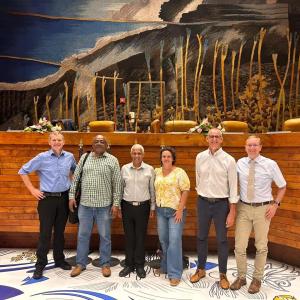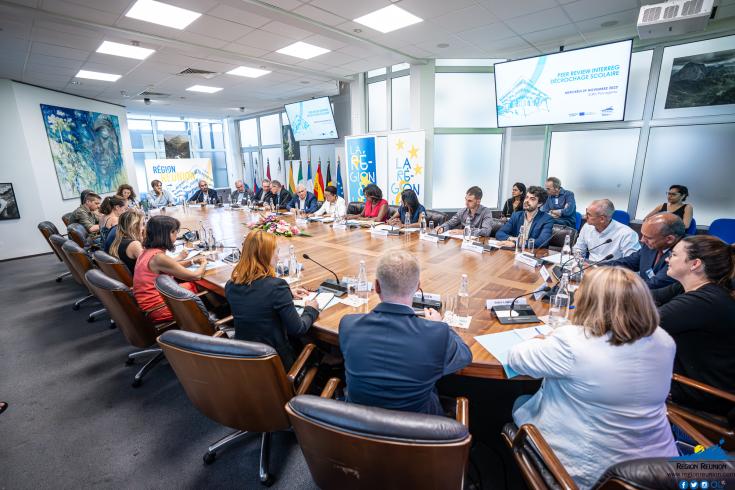Early school leaving and integration of NEETS into the labour market in Réunion Island
On 28-30 November 2023, the Policy Learning Platform hosted a peer review for the Regional Council of La Réunion (France). The Region was looking for advice and inspiration on how to prevent school and academic dropout rates, as well as to increase the employment rate of young people.
The Regional Council of La Réunion wishes to put in place an action plan to prevent and combat early school leaving, which is a major regional cause. This action plan will be based on a strategy to be defined with the local stakeholders. In this context, the following challenges were discussed:
Current state of affairs
Réunion is a French region located in the Indian Ocean near Madagascar and classified by the European Commission as one of the outermost regions (OR). Like all ORs, its development is hampered by structural problems due to its distance from France and Europe and its tropical climate, which makes it vulnerable to weather phenomena (cyclones and a rainy season) and very sensitive to climate change (rising sea levels and temperatures).
The island has a high unemployment rate: 17.2% of its 873,102 inhabitants in 2023, as well as a high poverty rate: in 2020, 36% of the inhabitants lived below the national poverty line of 1,382 €/month (one in two children belongs to a family living below the national poverty line).
One of the region's structural problems is its high school drop-out rate: although the law requires all French students under 16 to attend school, each year around 4,000 of them aged 16 or older leave the school system without any qualifications. In 2021, 41,000 young people aged between 15 and 28 will be counted as NEETs (not in education, employment or training).
They represent 26% of their age group and are twice as many as in France. Between the ages of 24 and 29, the percentage rises to almost 50%. The Regional Council is working hand in hand with the French Ministry of Education and Youth and all interested parties to improve the situation.
Peers from across Europe
Alongside Erwin Siweris, Thorsten Kohlisch, Luc Schmerber and Mario Vadepied from the Policy Learning Platform, eight highly committed peers from 7 European countries participated in the peer review:
- Francisco Caparros, Balearic Islands Government, Balearic Islands, Spain
- Marco Costantino, Apulia Region, Italy
- Chantal Fijalkowski, IAWM Institute for Training and further education in SMEs, Belgium
- Alexander Grit, Hanze University of Applied Sciences, Netherlands
- Indre Laučienė, Lithuanian Employment Service, Lithuania
- Dany Meessen, Ministry of the German-speaking Community, Belgium
- Jana Rožac, Employment Service of Slovenia, Slovenia
- Raphael Scerri, Jobsplus, Malta
Over three days, the Peers learned about the many local instruments and initiatives already in place, and shared their experiences in an intensive and dynamic exchange with the host region and the numerous local stakeholders fully engaged in the exchange process. Jointly, the participants elaborated and discussed tailor-made policy recommendations on how to address the policy challenges faced by our beneficiary.
The President, Huguette Bello, and the Vice-President of the Regional Council, Céline Sitouze, followed the exchanges and conclusions with genuine interest, underlining their political support for the follow-up process.
Our recommendations and guiding principles in a nutshell
While many actors are involved and many actions are showing results, the region lacks clear governance and a shared strategic plan to address the issue of early school leavers and the integration of NEETs into the labour market. Driven by the principles of regular communication, active coordination and humble leadership, such an integrated plan needs to be co-designed and shared by all relevant stakeholders, including the young people affected by the interventions and their parents and families.
The planning process, as well as the governance to be put in place, should contribute to strengthening the continuity of planning and funding across organisations. In addition, the strategic plan should be integrated with other strategic policy issues, such as economic development and youth policies, in order to ensure a strong convergence of efforts towards key sectors of the economy of today and the future.
All measures in place should be systematically evaluated, with the aim of continuously improving them where relevant. To prepare the ground for better synergies and complementarities, all stakeholders should be involved in the evaluation process. This also implies that successful interventions should be sustained beyond the limits of traditional project-based funding.
Comprehensive and targeted follow-up of young people throughout their education and vocational careers requires better monitoring of their pathways, overcoming the shortcomings of disconnected information systems. Ideally, an individual follow-up should be aimed for, so that anyone can be offered adequate support measures and opportunities.
While traditional school systems tend to encourage and support academic success, vocational careers often prove to be more appropriate and highly beneficial for many young people at risk of dropping out of school. Promoting a positive image of vocational education and training would encourage better early guidance and avoid unnecessary academic failure leading to early school leaving.
Peers' experiences in their countries show that NEETs are a very diverse group of people with different backgrounds and difficulties to cope with the traditional education and training systems. It is therefore not always appropriate to aim at bringing them back into these systems. There is a need for innovative and demand-driven approaches outside the traditional pathways to reach and motivate these individuals. These approaches can put spotlight on soft, emotional and transveralskills for personal development, rather than academic knowledge transfer.
The integration of NEETs into the labour market requires the commitment of enterprises by offering suitable jobs and accompanying young people throughout their vocational training process. In order to ensure a continuous flow of job opportunities for young people and successful training offers, enterprises need to be involved at an early stage in the design, implementation and evaluation of support measures.
A comprehensive strategy to prevent early school leaving and better integrate NEETs requires the exploitation of territorial opportunities. For example, La Réunion could consider developing stronger economic sectors such as the blue economy and the agri-food sector. Its geographical location in the Indian Ocean could also provide specific opportunities for new jobs.
While many measures for taking care of NEETs are already in place, more efforts should address the ones in danger of becoming school leavers during early school years, before those persons leave school and might be difficult to identify and motivate to get back into vocational pathways.
The peer review was broadly covered by the regional media, including written publications by IMAZ press and Freedom, and a video reporting by local TV France 1ère (See video from 24m20s).
Read more about these and other recommendations in the follow-up support, to be published here soon.

I'm delighted to welcome to Region Réunion a European delegation of experts to launch an in-depth process to coordinate our measures in the fight against early school leaving.The sharing of experiences and the delegation's findings will lead to the drafting of an action plan and the start of a collaboration between our different countries. I am proud that we have launched this action as part of the INTERREG Europe programme and the Peer Review project.

Thank you for all these discussions and the inspiration you have given us all. I hope that we'll be able to work together again to discuss our respective developments and share our collective intelligence.

The Peer Review opened a valuable insight in the topic and new connections for potential future cooperations, both among peers and with the hosting. The format of the Peer Review fostered deep work and understanding in a very short period of time.

Peer review publication
Find more information on the methodology and experiences of previous beneficiaries in our publication.

Apply for a peer review
Start your peer review application process today and find solutions to your policy challenge with our expert and peers!


